Marinara Sauce vs. Pasta Sauce: Differences & Which Is Better?
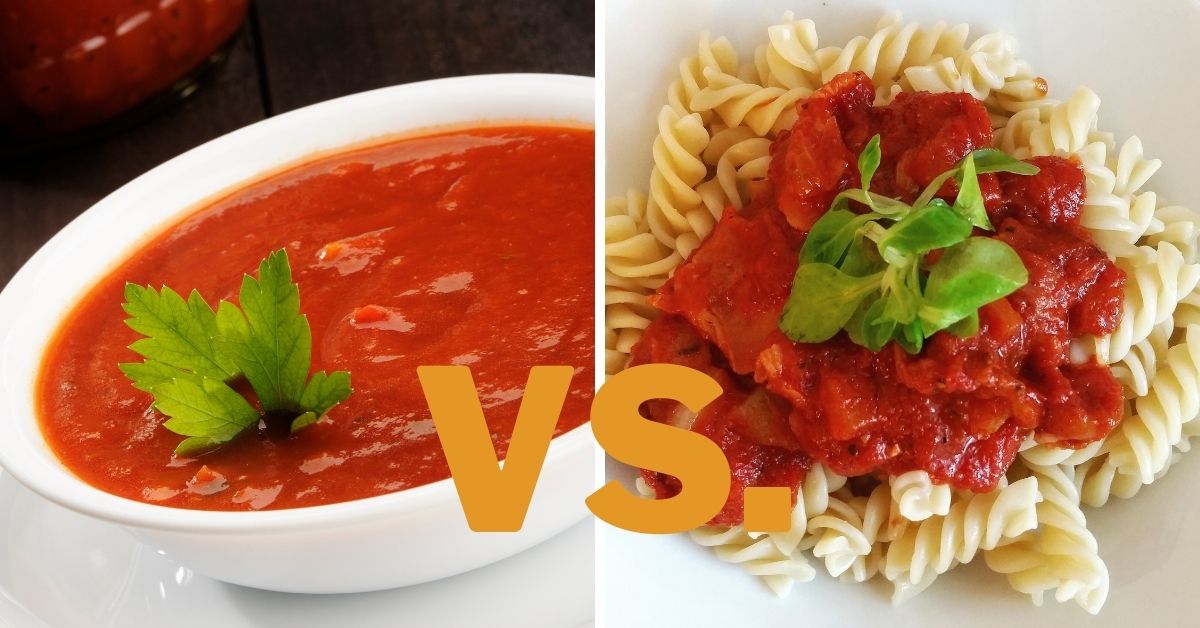

Two of the most common types of sauces you will hear people use are marinara sauce and pasta sauce, especially in Italian cuisine. Both incorporate tomatoes as their main ingredient and have similar colors and consistency. So, what are the differences between marinara sauce and pasta sauce?
Marinara sauce is much lighter and simpler compared to pasta sauce. Marinara typically employs only tomato, olive oil and garlic, which makes it less complex than pasta sauce. Additionally, marinara takes less time to cook while pasta sauce can have meat that prolongs its cooking time.
But despite their notable differences, both marinara and pasta sauce share many common attributes. So, they can often overlap each other in many recipes. That is why we are going to focus on the making process of these two sauces in more detail and see how and where you can use them.
Marinara Sauce vs. Pasta Sauce: What Is the Difference?
If you take a look at cuisines from around the world, you will notice that there are several different sauces that use tomatoes as their base. Some of these sauces make up a part of a dish while others are used as a condiment. Marinara and pasta sauce are two sauces that are used more as a part of a dish rather than a condiment.
But there are some notable distinctions between the two. And knowing the difference can help you to select the best sauce for your particular dish.
Appearance
From a distance, it can be quite difficult to tell these two sauces apart. Both have a bright red color and runny consistency.
But since marinara is often thinner than pasta sauce, its color can also be lighter in complexion. Pasta sauce can have a dark red color particularly if there is meat in it. This is due to the caramelization of the meat in the sauce.
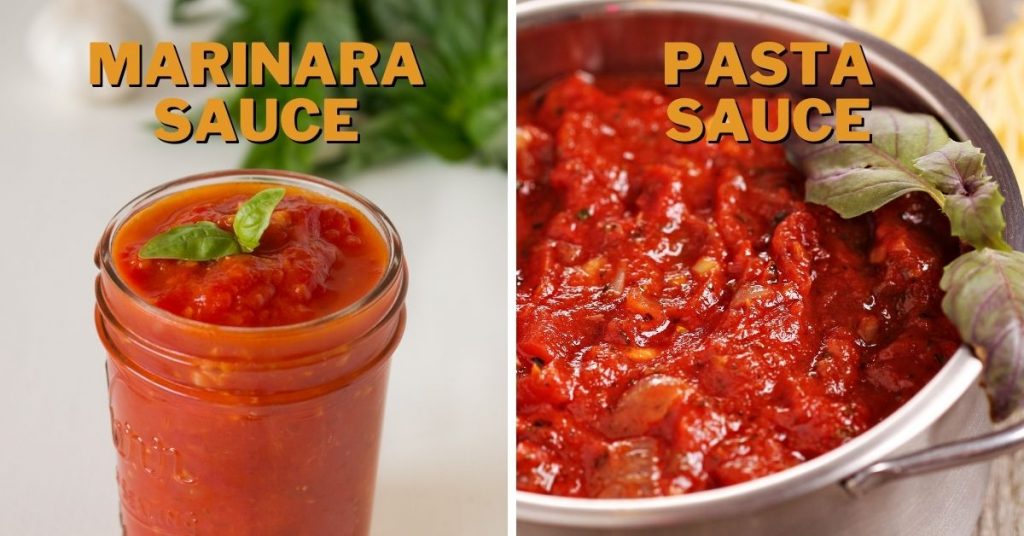
Ingredients
Traditionally, marinara sauce utilizes fewer ingredients than pasta or spaghetti sauce. The sauce is mostly tomatoes with garlic, olive oil, and herbs in the mix to add more flavor. Most people use fresh herbs such as oregano and basil.
Pasta sauces also utilize the aforementioned ingredients with some notable additions. For example, a common variation of pasta sauce uses meat such as pork or lamb in the mix. Basically, you can add any additional ingredient you want to pasta sauce. That can be meat, tofu, mushrooms, zucchini, tuna, or anything else.
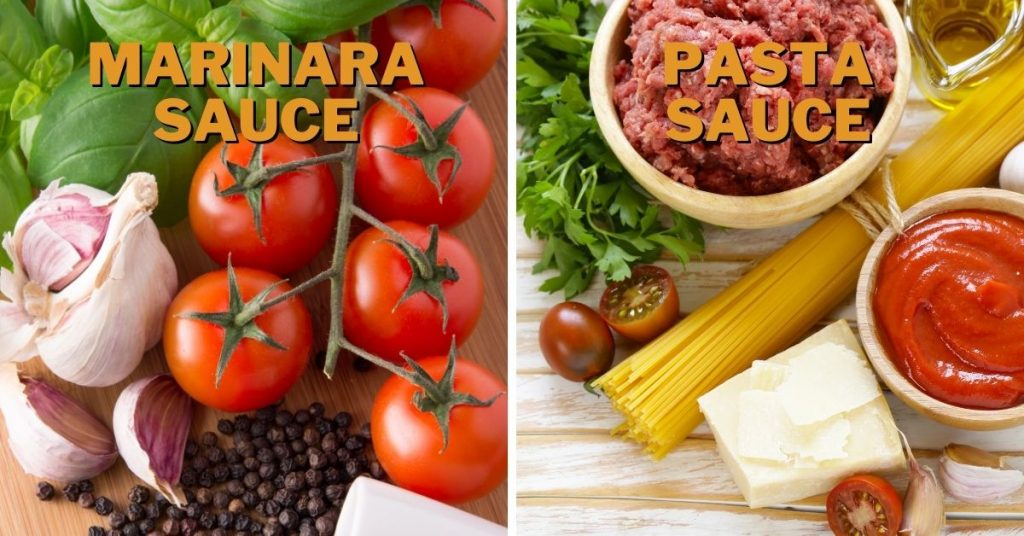
Preparation
Due to its simplistic nature, the marinara sauce has a significantly shorter cooking time. You can normally whip up a serving of marinara in an hour or so. You simply add the ingredients and stir it over a gentle simmer.
Pasta sauce, especially if it contains meat, will take much longer to cook. Usually, an hour and a half or two hours. It will slowly break down and thicken up in the process. This will result in a thick, rich, and often meaty sauce.
You usually start making marinara by sautéing the garlic first. Then you add in the tomatoes and start the slow simmering process. As you go along the way, you further season the sauce with salt, pepper, and various herbs.
In contrast, pasta sauce often starts with a roux made with flour and butter. Afterward, you add in the tomatoes, garlic, and herbs. So, you get a creamier sauce that is also heavier.
Taste and Texture
Since they are both tomato-based and use garlic and similar herbs, the taste can be interchangeable. However, marinara sauce is often made a bit lighter and thinner. In contrast, pasta sauce is thick and creamy (if it has a roux base).
And though not always, pasta sauce frequently partners meat or meat stock. This is why pasta sauce is often not a vegetarian dish. This also gives pasta sauce a meatier or protein-rich flavor. Marinara also has a runny consistency as it is not on the simmer for too long.
What Is Marinara Sauce Used For?
Just because it is arguably the simplest of all the classic Italian and Italian-American sauces, does not mean it has fewer applications. In fact, you can practically use marinara in any dish that calls for a tomato sauce. Here are some ideas for using marinara.
Use It as a Pasta Sauce
Nothing screams Italian as much as good pasta. And being a classic Italian sauce, marinara goes really well with any pasta. You can make penne pasta or vermicelli with marinara sauce. Depending on how much richness you want, you can make the sauce thicker than normal.
Pouring marinara sauce over even plain pasta will instantly elevate the dish to the next level.
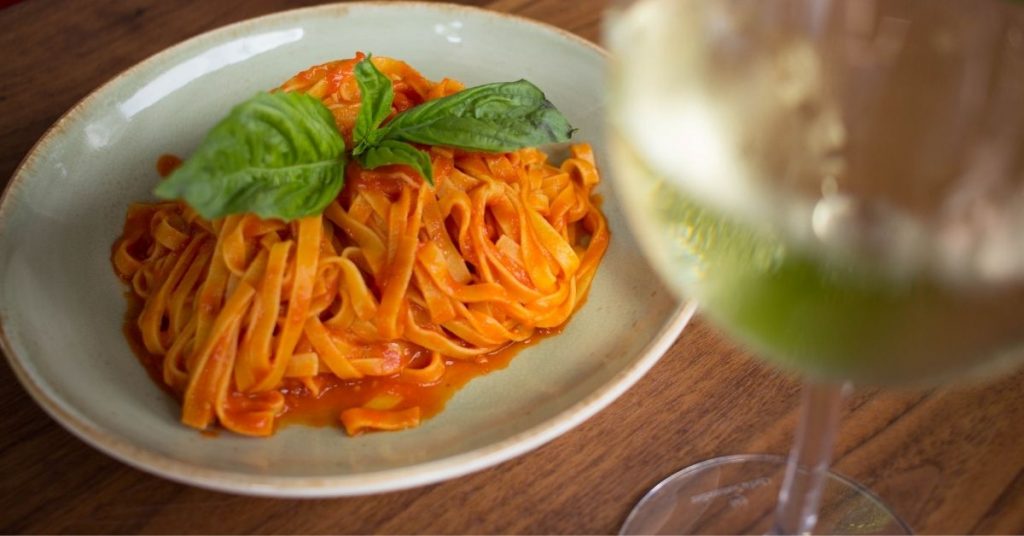
In Pizza
If there is any dish other than pasta that so easily invokes the feeling of Italian cuisine, it is pizza. And any pizza becomes ten times better with a good sauce. Use the marinara sauce and spread it on top of the cooked pizza or you can dip the pizza slices in the sauce.
Pizza Sauce vs. Marinara
Alternatively, you can use the sauce to make the crust tastier. The pizza crust is often the most neglected part of a pizza as it lacks real flavor. So, before baking it, cover the entire dough with a layer of marinara, especially around the crust. So, once it is cooked, the crust itself will become a delicious part of the dish and not just a nuisance.
If you have leftover pizza in the fridge, throw it in the oven or a pan, and then cover it with marinara sauce. The taste will go from leftover dinner to gourmet dining with just simple addition.
Use It to Dip Breadsticks
Thanks to its light and smooth consistency, marinara sauce is commonly used as a dip at parties. Make homemade breadsticks or garlic bread and enjoy it with fresh marinara sauces. Or you can take out a bag of chips or fries for a movie night and dip it in marinara for an extra punch of flavor.
Classic Meatballs in Marinara Sauce
Make the meatballs with ground meat of your choice or combine different types of ground meat if you want to try something different. Fry the meatballs in oil. Then cook them over medium heat with marinara sauce. You can also add some fried potatoes or pasta to the mix and make the dish all the more enjoyable.
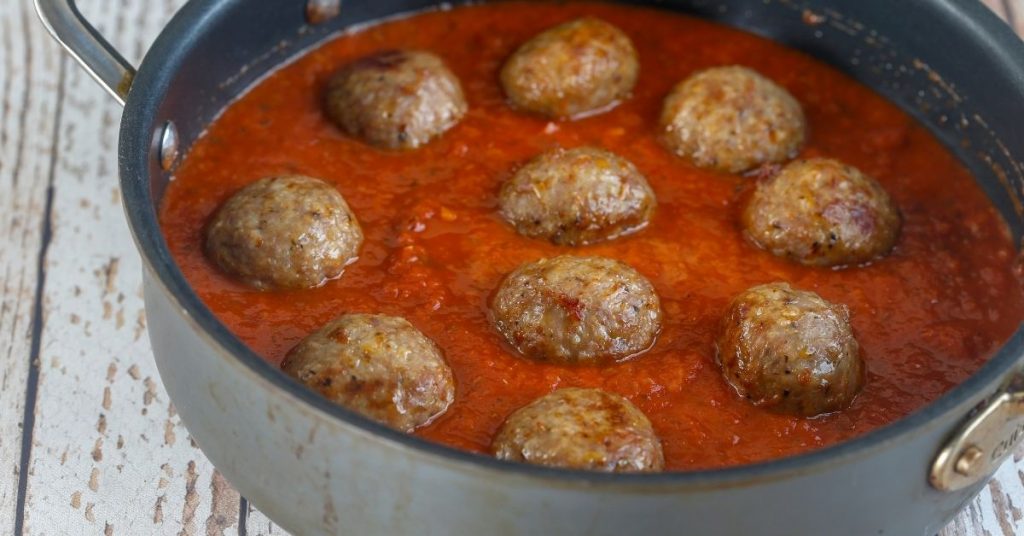
Make Lasagna
The marinara sauce goes very well with a meaty lasagna dish. Use it in between each layer and then apply some of the extra sauce on top of the whole thing.
Make Shakshuka
If you are tired of the same dishes and want to try some foreign flavors, try making homemade shakshuka. It is a very popular African Mediterranean dish made with poached eggs, olive oil, tomatoes, garlic, and pepper. So, using the marinara sauce in the dish is a very good alternative.
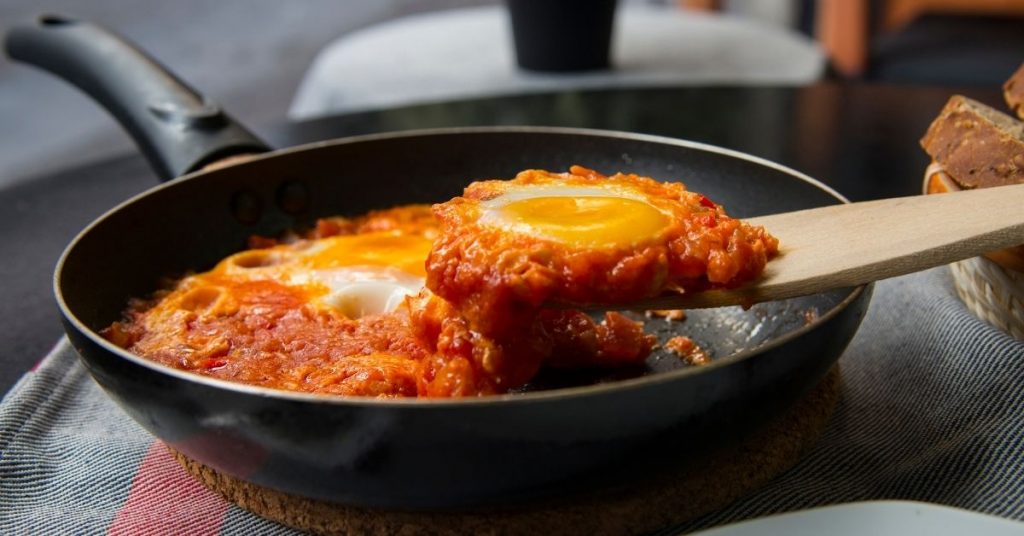
Mozzarella Sticks
Crunchy, creamy, and salty mozzarella sticks are a perfect afternoon snack. And dipping it in the fresh marinara sauce will only enhance the experience.
Difference Between Marinara and Spaghetti Sauce
Spaghetti is nothing more than a variation of pasta. Its distinctive feature is its long and thin strands that often roll up like noodles when it is cooked. You can use the marinara sauce on spaghetti.
Spaghetti usually uses pasta sauce as it is commonly made with meat (meatballs and spaghetti are a classic combination). But you can just as easily use the marinara sauce on top of the cooked spaghetti.
What Is Pasta Sauce Used For?
Pasta sauce is a tomato-based sauce that is thick, rich, and creamy. And despite the name, you can use pasta sauce outside of pasta dishes. It is often paired with dishes that contain meat. So, here are a few ideas on using pasta sauce:
Spanish Rice
Packaged rice can get a new look and flavor with pasta sauce. Cook the rice as it says in the instructions. But crucially, replace 1 cup of water with 1 cup of pasta sauce. Stir until you are happy with the consistency and you have yourself delicious Spanish rice for dinner.
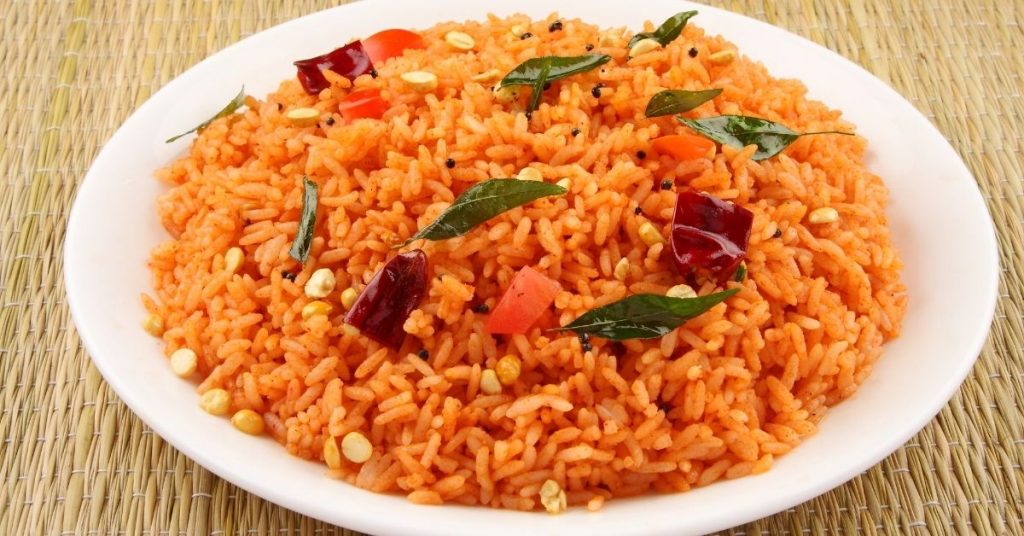
Stuffed Zucchini
Slice the zucchini in length and scoop out the seeds with a spoon. Now stuff the slices with tomato sauce, cheese of your choosing, thyme, oregano, salt, and Cayenne pepper. Then place on a baking tin and bake it for 10-15 minutes in a preheated oven.
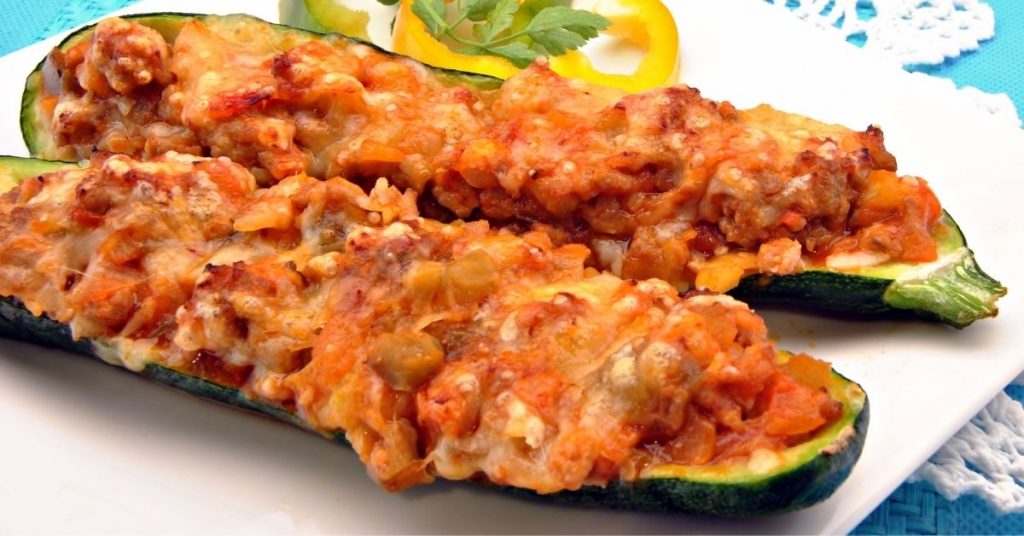
Eggplant Cheese with Pasta Sauce
This is a simple baked eggplant and Gouda dish that requires pasta sauce, eggs, breadcrumbs, and basil as additional ingredients.
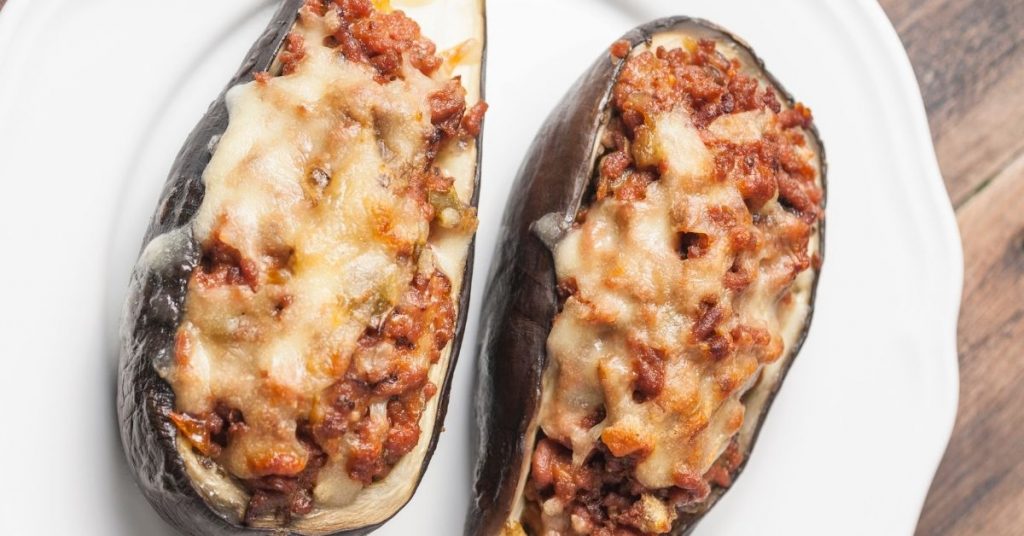
Pasta Sauce vs. Spaghetti Sauce: Is There a Difference?
In terms of flavor or texture, there really is no difference between pasta pause and spaghetti sauce. It all comes down to what you use the sauce on. So, if you use the sauce on top of pasta, you can call it pasta sauce. But if you were planning to use the same sauce in a spaghetti dish, you will likely call it a spaghetti sauce.
Marinara Sauce vs. Pasta Sauce: Which Is Better?
This depends on what you are looking for in the sauce. As we have seen, marinara is thinner and lighter than pasta sauce. On the other hand, pasta sauce can incorporate more ingredients and often have a meaty background.
Marinara sauce is a good candidate in two scenarios. First, you are looking for a sauce that is lighter and brighter and does not have a meaty taste. Second, you are short on time and you need to make the sauce in less than an hour. In both instances, making a marinara sauce is the way to go.
But if you have time in your hand and are looking for a richer, heavier sauce, then traditional pasta sauce will suit you best. Just remember that you need to be patient when making this sauce. So, it is best to start in advance lest you are caught wanting for time.
Can You Use Pasta Sauce Instead of Marinara?
You can certainly substitute pasta sauce with marinara in your recipe. Dishes such as pasta, spaghetti, meatballs, or pizzas work well with either of the two sauces. It is really up to you which one you prefer.
If you like your sauce to be thicker and creamier, you should go with pasta sauce. But if you want a bit lighter touch that takes less time to make, then marinara is probably the way to go.
Why Do They Call It Marinara Sauce?
The word “marinara” translates to “mariner’s” or “mariner’s style”. It can also translate to “sailor’s style”. Now, the exact origin of the sauce is not known. But it is in the region of northwest Italy where the origin of marinara sauce lies.
The common idea is that this sauce was a staple that sea-faring merchants would normally consume as it was a simple sauce that took little time to make. So, the sauce became the “mariner’s sauce” or marinara.
How Long Can You Store Marinara Sauce?
After making it, you can store the marinara sauce in a freezer for 4 months without a problem. If you are keeping it in a refrigerator, then you should use it up for 1 or 2 weeks. In both cases, let the sauce thaw to room temperature. You can also heat it over a pan for a few minutes and then use it.
Is Marinara Sauce Good For You?
Homemade marinara sauce exclusively uses tomatoes, garlic, and various herbs. so, it is a low-fat, low-calorie sauce that will give you the nutritional benefits of tomatoes.
Can Marinara Sauce Be Vegan?
Unlike pasta sauce, marinara sauce is almost always vegan or vegetarian friendly. Most marinara recipes do not call for meat to be included in the meat. So, if the rest of the dish does not contain any animal protein, you can safely eat marinara sauce on a vegan or vegetarian diet.
Both marinara and pasta sauce are great options for a variety of dishes. They can elevate any plain dish and make it a hearty, warm, and comforting meal in an instant.
